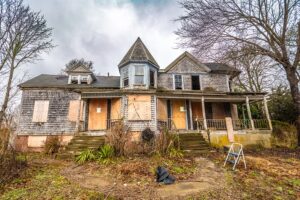WELLFLEET — The owner of a sprawling house at 177 Peace Valley Road that has been abandoned for years and condemned since 2018 has been given a final chance to bring the house back to safe living conditions as defined in state codes.

At a hearing scheduled for Dec. 17, owner Robert Bonds must demonstrate to the state’s southeast regional court that he is meeting the court’s timetable for making a long list of repairs. If he does not, the state attorney general’s office can move forward with its petition for a court-ordered receiver to take charge of the property.
The attorney general’s office became involved in 2023 when it agreed to oversee the property’s restoration as part of its Abandoned Housing Initiative.
Bonds, who lives in Boston, purchased the 19th-century Queen Anne house for $65,000 in 1983. Complaints about his neglect of the 3.7-acre property date back to at least 2001, when neighbors reported a heating oil tank lying in the bushes, a car battery and assorted trash on the lawn, and bricks missing from two chimneys.
Wellfleet’s health dept. gave Bonds 30 days to clean up the property, but there is no indication that he complied. Further complaints were filed over the next several years, and in 2018 the health dept. condemned the decaying house for state health code violations.
The condemnation did not prompt Bonds to repair the property, however. Holes in the roof got larger, more windows were broken, and wildlife took up residence in the house.
Town officials appealed for help to the attorney general’s neighborhood renewal division, which focuses on residential properties with extensive code violations. In 2023, the agency contacted Bonds, who indicated he would address the violations, but according to court documents, he never followed through.
On May 24, 2024, the attorney general’s office asked a judge in the southeastern division of Housing Court to place the property in receivership.
That court filing included an affidavit from Wellfleet Health Agent Heith Martinez, who had visited the property in April and documented a list of problems, including a lack of gas, electricity, and water service; a lack of toilets, sinks, and kitchen appliances; and an accumulation of refuse.
On July 31, Bonds signed a legal agreement giving him the opportunity to bring the property up to code and avoid receivership. The agreement between Bonds and the attorney general’s office laid out a timetable for gutting the interior of the house, securing permits from the town, and making improvements that would render the house fit for human habitation.
In late August, Wellfleet’s building dept. issued Bonds a permit for interior demolition work.
On Nov. 27, Bonds’s general contractor, Adrian Moylette, submitted another application for partial demolition and extensive renovations — $623,000 worth of work. Moylette did not file engineering plans for the work, however, which means the application is incomplete and cannot be acted on, according to interim Building Commissioner Victor Staley.
Among the renovations Moylette applied to perform are removing and replacing the roof, exterior porches, and interior wall and floor framing; rebuilding the foundation “as needed”; replacing all the windows and doors; and removing exterior wood shingles and replacing them with siding.
Moylette’s application also includes new plumbing, heat, insulation, Sheetrock, and electrical work. A new septic system will have to be permitted and installed along with a new kitchen and bathrooms.
Once the engineering plans are added to the application, Staley will have 30 days to review it. If the permit is issued, the work must begin within 180 days, Staley said.
Bonds’s next hearing is on Tuesday, Dec. 17, however. If he hasn’t filed engineering plans by then, the court will have to decide if his progress is sufficient to avoid receivership.
A court-appointed receiver has the power to make repairs to a property and bill the property owner for all costs. If the owner fails to pay, the receiver can petition the court to foreclose on the property, with first proceeds from the auction going to pay the receiver’s costs.
Frequently, the receiver bids on the property in the amount of the repair work that has been done — effectively paying his or her own expenses. If there are no higher bids, the receiver can get the repaired property with a clean title and no further costs.
The attorney general’s office declined to comment on the Dec. 17 hearing other than to say that Bonds is expected to report on the progress of his rehabilitation efforts.
The remote-participation Housing Court hearing will take place at 10 a.m. and can be viewed online.
Editor’s note: An earlier version of this article, published in print on Dec. 12, incorrectly reported the year when Robert Bonds bought the house on Peace Valley Road. It was 1983, not 1985.



